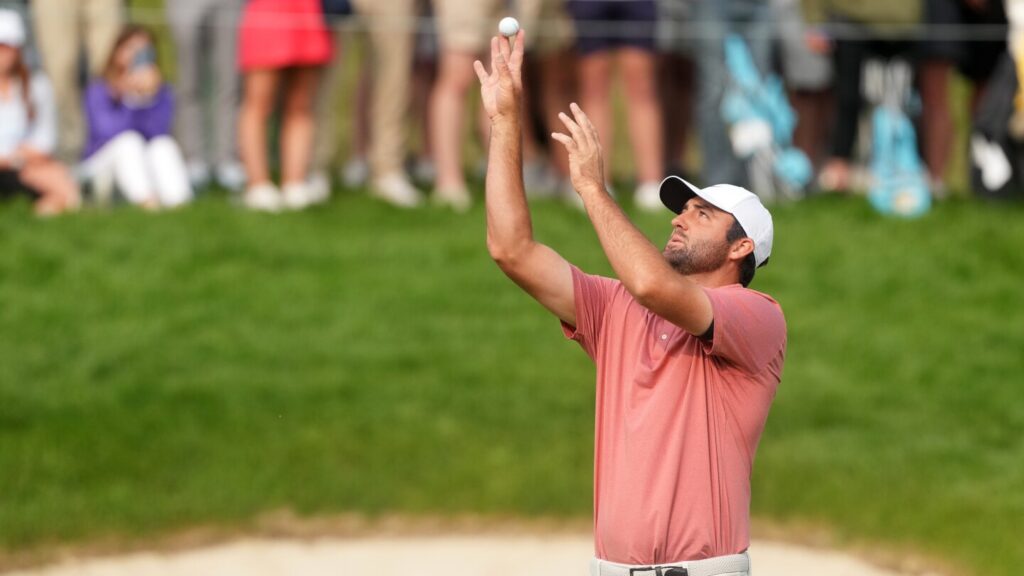DUBLIN, Ohio – For the second time in three weeks, Mother Nature and the dynamics of a golf ball’s flight have coalesced to create unrest among the game’s best and brightest.
Mud balls are an issue this week at the Memorial, just as they were earlier this month at the PGA Championship, when world No. 1 Scottie Scheffler railed against a rules decision that allowed chance, not skill, to dictate the outcome.
Scheffler’s take, which is born from decades of perfecting his craft, was ultimately vindicated when he won his third major championship that Sunday at Quail Hollow Club, which was drenched by rain much like Muirfield Village has been this week.
But then Jack’s Place is historically one of the PGA Tour’s messy and muddiest, which likely makes the decision not to play preferred lies for golf balls in closely mown areas even more curious.
Heavy rains throughout the week have left Muirfield Village soaked but perfectly playable if not for the ever-present mud ball.
“A perfect example is the second hole today, Adam [Scott] has hit a perfect tee shot in the left side of the fairway and the whole left side of his ball is caked in mud,” Brandt Snedeker explained. “He’s done everything he should do, he’s driven it down the left side of the fairway and has a 9-iron in his hand and has no chance of hitting this green. He’s got to play it to the left bunker and pray the mud does what it’s supposed to do and, of course, it didn’t. That is not equitable and it’s one of a thousand times it happened this week.”
Snedeker’s concern beyond the obvious impact on the competitive integrity of the event was the process the Tour uses to determine when to allow players to lift, clean and place. It’s a process that is more art than science.
A cold, soaking rain on Day 2 at the Memorial set the stage for cool, clear skies and winds that gusted to 26 mph on Saturday – the perfect recipe for mud balls.
“Two holes that I hit the fairway I did not [have a mud ball], one of them the ball was imbedded and I got to clean it [under the Rules of Golf],” said Maverick McNealy, who hit 11 of 14 fairways on Day 3 on his way to a 69. “I’m not sure why [officials didn’t play preferred lies]. I was just about to ask the officials about it. I don’t know why you wouldn’t play lift, clean and place today.
“As a consensus, Tour players like to be rewarded for good shots and penalized for bad ones. That’s why we don’t like mud balls.”
At the PGA Championship, it was the PGA of America’s venerated setup man Kerry Haigh whose decision to not allow preferred lies was questioned but also not entirely unexpected. As a rule, Haigh is very much old school and rarely allows for preferred lies in the association’s championships.
This week is different.
The PGA Tour’s philosophy for playing the ball up is based on the idea of “extreme mud,” which means the incidents of mud balls must be more than simply isolated and instead widespread throughout the golf course.
Depending on who you ask, the line Saturday at Muirfield Village seemed to waiver between the two extremes.
“I mean, we got a lot of mud balls,” said Keegan Bradley, whose 68 moved him into the top 10. “Pretty much if you hit the fairway, you had some sort of mud ball. Some were worse than others. But, yeah, a good amount.”
Anecdotally, Bradley, Snedeker and McNealy would suggest the presence of “extreme mud balls,” but to be fair the Tour’s rules committee debated whether to play the ball “up” for over an hour both Friday and Saturday morning. It’s also worth pointing out that Jack Nicklaus, the legendary host of the Memorial, was not involved in the decision to forgo preferred lies.
Players do have a remedy for what some see as a capricious preferred lie policy. As evidenced by this week’s player-driven changes to the format at the Tour Championship, player empowerment has fully arrived in professional golf and the membership’s voice has never been louder or more important.
If the Player Advisory Council and policy board want change it is only a few meetings and a final vote away, but there will be those who caution to be careful what you ask for. A change to the preferred lie policy may be what players want, but it might not be what’s best for the game.
Read the full article here


